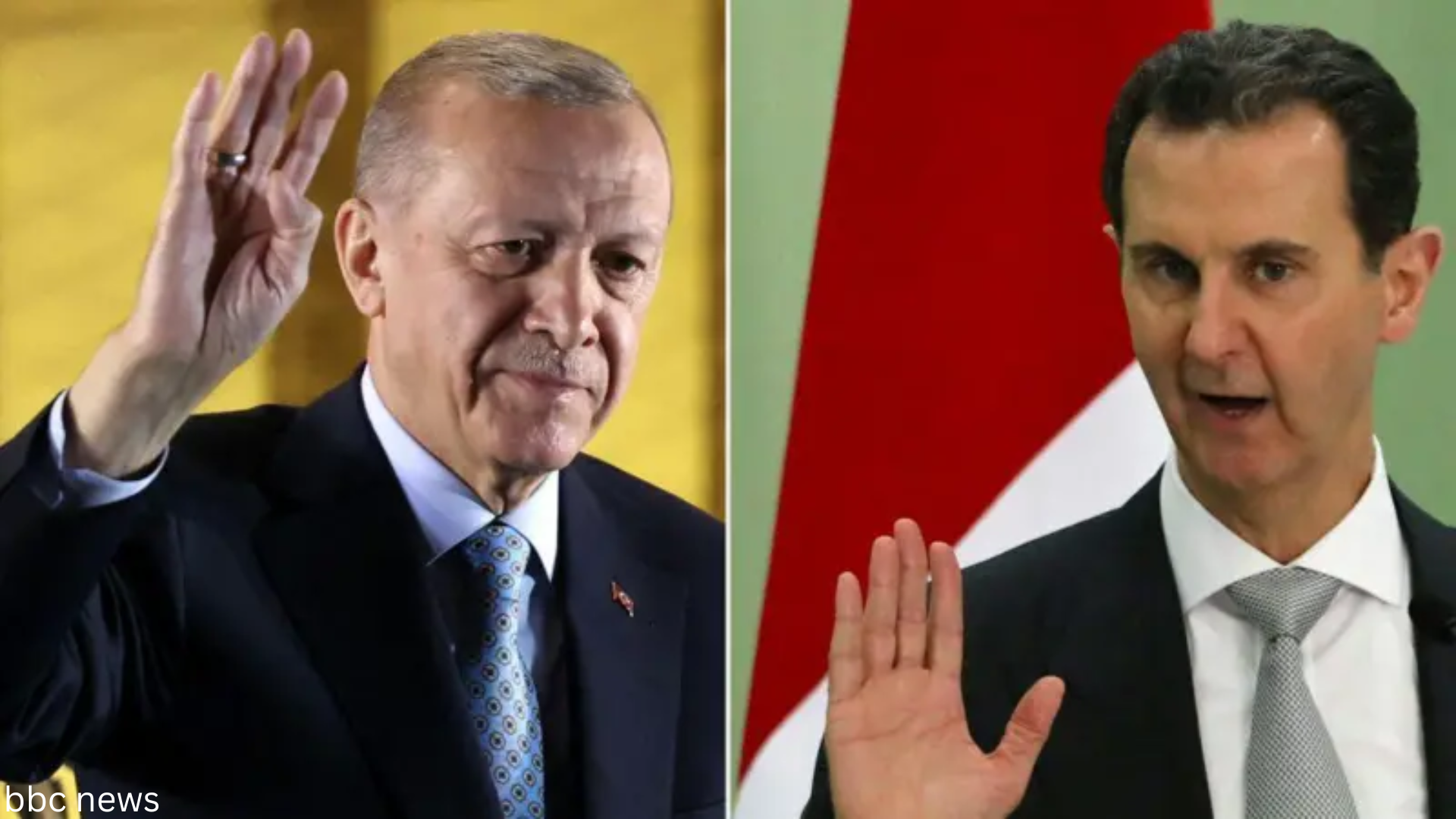On July 7 this year, Turkish President Recep Tayyip Erdogan said that he would invite Syrian President Bashar al-Assad for talks.
Erdogan had said that he wants Turkey’s relationship with Syria to be the same as it was in the past.
Just a week after Erdogan’s statement, Bashar al-Assad had said that he would meet Erdogan only when there would be concrete talks on important issues.
Assad had said, “The issue is not about meeting. The issue is whether Turkey will stop supporting terrorism. Will Turkey withdraw its troops from Syrian soil?”
The same Erdogan who wanted to invite Bashar al-Assad to Turkey for talks, walked out of the meeting which Bashar al-Assad was going to address, after about four months.
There was a conference of Islamic countries in Saudi Arabia’s capital Riyadh last month. The then President of Syria Bashar al-Assad and the President of Turkey Recep Tayyip Erdogan also went to attend it.
When the President of Syria Bashar al-Assad stood up to speak in the joint meeting of the Arab League and the Organization of Islamic Cooperation (OIC) at this conference, his representative was sitting in the chair of Turkish President Recep Tayyip Erdogan instead of him.
Erdogan’s victory?
Perhaps Erdogan knew that Bashar al-Assad was now going to become a thing of the past.
When Bashar al-Assad left Syria and went to Russia, Erdogan said, “There are only two leaders left in the world. Me and Putin. I have been in power for the last 22 years. Putin has also been in power for almost the same number of years. The rest of the leaders were either eliminated or were thrown out of power.”
When Erdogan was saying this, he must have had in his mind that even though Assad had the support of Putin and Iran, Turkey still proved to be better than him.
Some experts are saying that Erdogan has emerged as the biggest winner in the downfall of Bashar al-Assad in Syria.
Erdogan had been supporting the armed opposition in Syria for more than a decade. But it is also being said that Turkey’s relations with the Islamic group ‘Hayat Tahrir al-Sham’, which led to the ouster of Bashar al-Assad, are also full of complications.
Despite this, most analysts consider the ouster of Bashar al-Assad to be in Erdogan’s favor politically and economically.
Omar Ozkizilki, a senior fellow at the think tank Atlantic Council, told the British newspaper Financial Times, “Turkey is the biggest winner here after the people of Syria. When everyone had left the people of Syria to their fate, Turkey supported them.”
Opportunity for Turkey
When the Arab Spring began in 2011, it was an opportunity for Turkey. Erdogan welcomed more than 30 lakh Syrian refugees.
Turkey provided military equipment and training to Assad’s opponents. But Iran and Russia stood by Assad. Even when Erdogan was offering talks with Assad, he did not stop supporting the Syrian rebels.
After Assad departs from Syria, Erdogan’s hope has increased that more than 30 lakh Syrian citizens living in Turkey will be sent back.
Even Erdogan’s supporters were not happy with the presence of millions of Syrians in Turkey. When the rebels captured Aleppo in Syria, Turkey’s Home Minister Ali Yerlikaya said that 13 lakh Syrian refugees living in Turkey are from Aleppo and most of them are not able to hide their happiness of going back.
Turkey is already struggling with inflation and recession. In such a situation, Turkey will be able to restore trade on the 900-kilometer border with Syria after Bashar al-Assad’s departure.
With Assad’s departure, Erdogan’s relations with Russia and Putin will also change. Putin used to support Assad in Syria. But Turkey has never had control over Hayat Tahrir al-Sham.
When HTS took control of Idlib, Turkey was the main route for contact with the outside world. Turkey also benefited from this. It is not yet clear how much influence Turkey will have on HTS leader Abu Mohammad al-Julani. Now the whole of Syria is under the control of Julani and his associates.
Restoration of peace and stability in Syria still seems a distant dream. There is a fear that the conflict may start again. In such a situation, there may be a flood of Syrian refugees in Turkey once again.
Will Turkey’s complications increase?
Ilhan Uzel is a professor of political science at Ankara University and is the leader of Turkey’s opposition party CHP. He fears that Erdogan has created such a situation that a new Afghanistan can emerge on the border.
Want to promote your website organically contact us and rank your website with our SEO expert
Many analysts also believe that Turkey has still not been able to get out of the thinking that Syria was a part of the Ottoman Empire.
On the other hand, HTS leader Julani has said that no foreign intervention will be accepted in Syria now. The biggest question is what will be the role of Syrian Kurds in the future government?
If Kurds get autonomy in the new government, then their dominance will increase in north-eastern Syria.
If there is a dialogue between armed Kurdish groups and the new government in Syria, then the situation will be more difficult for Turkey. Armed Kurdish groups of Syria have been associated with the Kurdistan Workers Party and Turkey has declared it a terrorist organization.
Turkish Foreign Minister Hakan Fidan said on Sunday that any group associated with the Kurdistan Workers Party in Syria should not have any talks with the future government of Syria.
The US has been supporting the Kurds. It is also not clear what America’s stance will be regarding the Kurds. America’s newly elected President Donald Trump said on Saturday that the war going on in Syria is not America’s war.
In such a situation, it would be hasty to say that Erdogan has emerged as a winner. Even after the departure of Bashar al-Assad in Syria, no one has control over the situation there.
Erdogan also faces problems within Turkey. The Turkish constitution does not allow Erdogan to contest elections again in 2028. Erdogan can change the Turkish constitution only on the basis of an overwhelming majority in the Parliament.
To remain in power, he will need the support of the Kurdish-backed party. Erdogan recently began talks with jailed Kurdistan Workers Party (PKK) leader Abdullah Ocalan.
Assad’s ouster from Syria is being seen as favorable for Turkey in many respects, but there are many challenges too.
American magazine Foreign Policy columnist Steven Cook has written, “The first problem for Turkey in Syria is its partners – HTS and SNA (Syria National Army). Both rebel groups have a troubling past. HTS has its roots in Al-Qaeda and Islamic State. Everyone knows about the relationship between Al-Qaeda and HTS, but its association with Islamic State has not been very public.”
Steven Cook has written, “According to American intelligence agencies, Islamic State has played a major role in setting up Al-Nusra Front and HTS leader Abu Mohammad al-Julani has led Al-Nusra. Julani did not separate himself from Al-Nusra Front and Islamic State due to ideological differences, but Abu Bakr al-Baghdadi of Islamic State wanted Al-Nusra to merge with Islamic State. In such a situation, Julani’s autonomy would have been affected. Julani tried to show HTS as different from Islamic State, despite this, America, the United Nations, the EU, and Turkey had declared HTS as a terrorist organization.”
But Erdogan’s victory over Putin is being seen as an achievement. It is being said that in recent years Russia and Turkey have been involved in three wars against each other through their proxies and Turkey has been successful in winning 3-0. These three wars are – Libya, Karabakh, and Syria.
Russian affairs analyst Karim Has has said in an interview that Turkey will now want to control more and more areas of Syria but the position of Kurds in Syria will also be strong.
Karim Has says, “The biggest challenge for Erdogan is that the Turkish constitution does not allow him to contest the 2028 elections. Erdogan can release Abdullah Ocalan from jail to change the constitution. Erdogan will need the support of the Kurds and this will also have an impact in Syria. It is possible that the PKK lays down its arms and the peace process with the Kurdish rebels concludes.”


